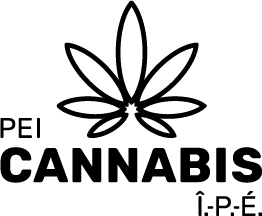What are Minor Cannabinoids?
Minor Cannabinoids
Cannabis is comprised of many components, such as the two major cannabinoids: THC and CBD, as well as terpenes. There are also other cannabinoids present in much smaller quantities. These are known as minor cannabinoids, and include: CBG, CBN, CBC, and THCV.
They’re called “minor” because they are found in relatively small, or ‘trace’ amounts in cannabis, compared to the more dominant “major” compounds, THC and CBD.
There are over 100 different cannabinoids, and new ones continue to be discovered. Both major cannabinoids and minor cannabinoids mimic natural chemicals that our bodies produce; they interact with receptors in our body, affecting functions such as appetite, mood, balance, memory, and movement.
Here are some minor cannabinoids you may find in some PEI Cannabis products:
CBG – Cannabigerol
CBG is non-psychoactive and non-intoxicating. According to Health Canada, early research suggests possible benefits for pain relief and inflammation. Every cannabinoid, including major cannabinoids, starts off as CBG in the early growth stage of the plant before being converted into other cannabinoids as the plant matures.
CBN – Cannabinol
CBN is a product of THC oxidation. Its concentration typically increases as the cannabis plant ages. Like THC and THCV, CBN binds to the type 1 cannabinoid receptor (CB1 receptor) which has the potential to be an intoxicating cannabinoid. While research on CBN is scarce, there are studies underway into the possible effects that CBN has on relaxation and sleep when combined with THC.
CBC – Cannabichromene
CBC is also non-psychoactive and non-intoxicating. It is currently being studied for its effects on pain and inflammation. Theres also other research underway investigating potential effects on anxiety and depression when combined with major cannabinoids.
THCV – Tetrahydrocannabivarin
THCV is a psychoactive minor cannabinoid with minimal intoxicating effects, predominately found in sativa-dominant strains. Studies are currently underway to learn more about its effects and how it potentially could be an appetite suppressant.
CBG, CBN, CBC, and THCV are commonly found in products with major cannabinoids, and are available in many formats, including edibles, beverages, oils, capsules, and pre-rolls.
Minor Intoxicating Cannabinoids
As noted above, CBN and THCV both have intoxicating effects. So, what exactly are minor intoxicating cannabinoids?
According to Health Canada, an intoxicating cannabinoid is a cannabinoid that binds to and activates the type 1 cannabinoid receptor (CB1 receptor). Delta-9-THC is the most researched intoxicating cannabinoid. Very little is known at this point on the effects of other intoxicating cannabinoids.
However, there is evidence to suggest that the following cannabinoids also bind to, and activate the CB1 receptor:
- delta-8-THC
- delta-10-THC
- delta-6a-10a-THC
- THC-O-acetate (THC-O)
- cannabinol (CBN)
- hexahydrocannabinol (HHC)
- tetrahydrocannabivarin (THCV)
- tetrahydrocannabiphorol (THCP)
- tetrahydrocannabutol (THCB)
It is important to note that this is by no means a final list as research continues.
Additional Resources
Health Canada: Guidance on cannabis products with intoxicating cannabinoids other than delta-9-THC – www.canada.ca/en/health-canada/services/cannabis-regulations-licensed-producers/intoxicating-cannabinoids.html
Government of Canada: Review of cannabidiol: Report of the Science Advisory Committee on Health Products Containing Cannabis – www.canada.ca/en/health-canada/corporate/about-health-canada/public-engagement/external-advisory-bodies/health-products-containing-cannabis/review-cannabidiol-health-products-containing-cannabis.html

